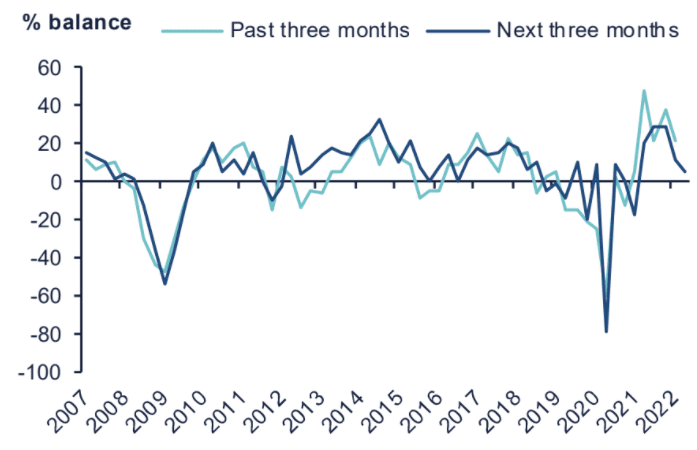Business Optimism Slumps at Fastest Pace since Covid Crisis
- Written by: Gary Howes

Image © Adobe Images
Sentiment amongst Britain's manufacturers has fallen by its sharpest pace since the height of the Covid crisis of April 2020.
The CBI's quarterly Industrial Trends Survey showed businesses were increasingly dour about the outlook, citing the rising cost of raw materials as the main headache.
The CBI also said manufacturing output and new orders slowed and costs and selling prices grew at their fastest paces in over 40 years.
However, growth remained above the long-run average (+3%) as the post-Covid rebound continued to offer some support.
Investment intentions weakened notably, but employment growth improved and is expected to pick up further next quarter.
Business optimism fell to -34% from -9% in January while output volumes in the quarter to April grew at a slower pace than in the quarter to March (balance of +19% from +27%).
"We think manufacturers are right to be relatively downbeat about the outlook and expect production to flatline over the rest of this year," says Samuel Tombs, Chief UK Economist at Pantheon Macroeconomics.
Total new orders rose at a slower pace in the three months to April compared with January (+22% from +38%).
Above: "Trend in total new orders" - CBI.
"The manufacturing sector is slowing as customers temper their demand in the face of huge increases in prices. The fall in the total orders balance to its lowest level since October is worrying because manufacturers report whether orders are above or below “normal". This means that the balance acts as an indicator of the level of orders rather than the growth rate," says Tombs.
Inflationary pressures are intense: average costs in the quarter to April grew at the fastest rate since July 1975 (+87% from +74% in January), while domestic prices grew at the fastest pace since October 1979 (+60% from +40% in January).
A supplementary question asked of businesses by the CBI revealed the cost of raw materials was the most important factor behind expectations for cost growth in the next three months (80% of respondents said this was extremely important).
This was followed by energy costs (59%), transport costs (41%) and labour costs (38%).
Looking ahead, firms expect growth to slow further over the next three months (+6%).
“The government must look again at near-term support measures to help firms through this crisis. An immediate priority should be to provide cashflow support for those struggling with wholesale energy costs via the Recovery Loan Scheme, while cutting bills for Energy Intensive Industries can help maintain UK competitiveness," says Anna Leach, CBI Deputy Chief Economist.
Investment intentions for the year ahead weakened across the board in comparison to January: plant & machinery (+9% from +26%), product & process innovation (+1% from +26%), training (-3% from +26%) and buildings (-6% from +2%).
Employment trends remains positive with the survey finding the numbers employed grew at a faster pace in the quarter to April compared to January and are expected to grow at a quicker rate in the next three months.




